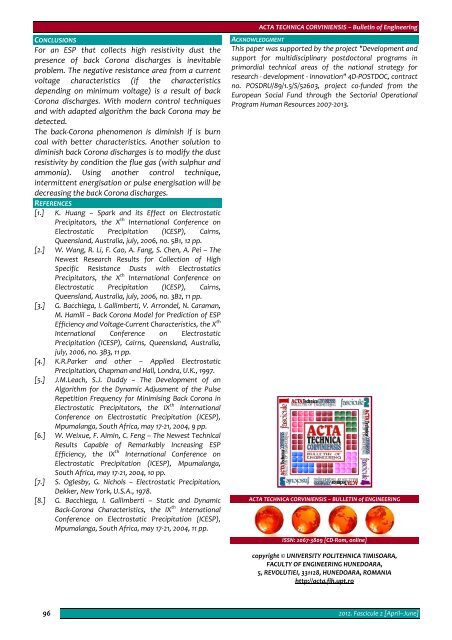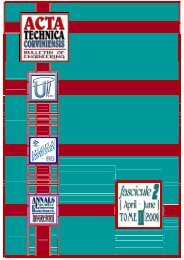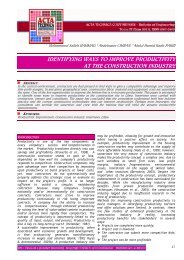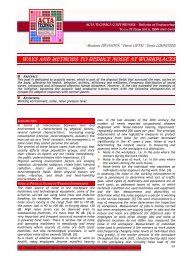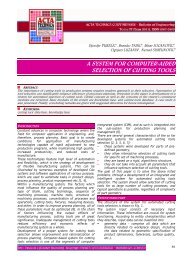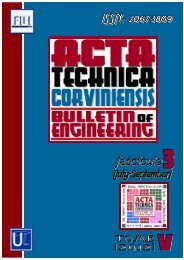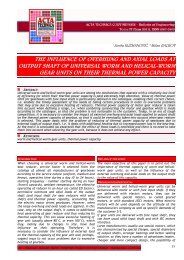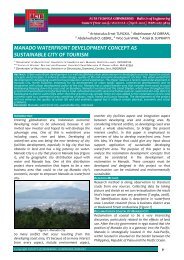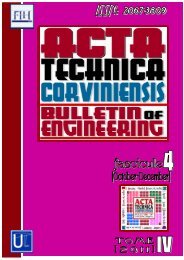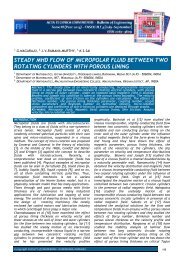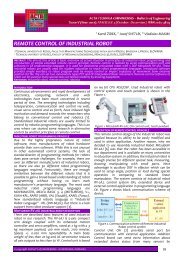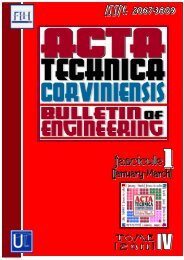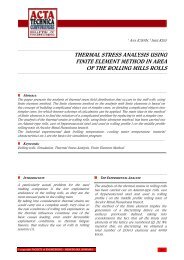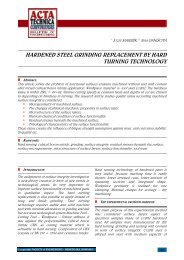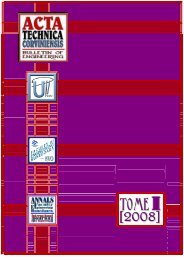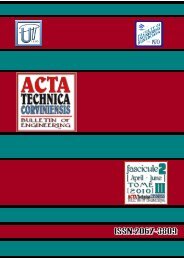Editorial & Advisory Board - Acta Technica Corviniensis
Editorial & Advisory Board - Acta Technica Corviniensis
Editorial & Advisory Board - Acta Technica Corviniensis
You also want an ePaper? Increase the reach of your titles
YUMPU automatically turns print PDFs into web optimized ePapers that Google loves.
ACTA TECHNICA CORVINIENSIS – Bulletin of Engineering<br />
CONCLUSIONS<br />
For an ESP that collects high resistivity dust the<br />
presence of back Corona discharges is inevitable<br />
problem. The negative resistance area from a current<br />
voltage characteristics (if the characteristics<br />
depending on minimum voltage) is a result of back<br />
Corona discharges. With modern control techniques<br />
and with adapted algorithm the back Corona may be<br />
detected.<br />
The back‐Corona phenomenon is diminish if is burn<br />
coal with better characteristics. Another solution to<br />
diminish back Corona discharges is to modify the dust<br />
resistivity by condition the flue gas (with sulphur and<br />
ammonia). Using another control technique,<br />
intermittent energisation or pulse energisation will be<br />
decreasing the back Corona discharges.<br />
REFERENCES<br />
[1.] K. Huang – Spark and its Effect on Electrostatic<br />
Precipitators, the X th International Conference on<br />
Electrostatic Precipitation (ICESP), Cairns,<br />
Queensland, Australia, july, 2006, no. 5B1, 12 pp.<br />
[2.] W. Wang, R. Li, F. Cao, A. Fang, S. Chen, A. Pei – The<br />
Newest Research Results for Collection of High<br />
Specific Resistance Dusts with Electrostatics<br />
Precipitators, the X th International Conference on<br />
Electrostatic Precipitation (ICESP), Cairns,<br />
Queensland, Australia, july, 2006, no. 3B2, 11 pp.<br />
[3.] G. Bacchiega, I. Gallimberti, V. Arrondel, N. Caraman,<br />
M. Hamlil – Back Corona Model for Prediction of ESP<br />
Efficiency and Voltage‐Current Characteristics, the X th<br />
International Conference on Electrostatic<br />
Precipitation (ICESP), Cairns, Queensland, Australia,<br />
july, 2006, no. 3B3, 11 pp.<br />
[4.] K.R.Parker and other – Applied Electrostatic<br />
Precipitation, Chapman and Hall, Londra, U.K., 1997.<br />
[5.] J.M.Leach, S.J. Duddy – The Development of an<br />
Algorithm for the Dynamic Adjusment of the Pulse<br />
Repetition Frequency for Minimising Back Corona in<br />
Electrostatic Precipitators, the IX th International<br />
Conference on Electrostatic Precipitation (ICESP),<br />
Mpumalanga, South Africa, may 17‐21, 2004, 9 pp.<br />
[6.] W. Weixue, F. Aimin, C. Feng – The Newest <strong>Technica</strong>l<br />
Results Capable of Remarkably Increasing ESP<br />
Efficiency, the IX th International Conference on<br />
Electrostatic Precipitation (ICESP), Mpumalanga,<br />
South Africa, may 17‐21, 2004, 10 pp.<br />
[7.] S. Oglesby, G. Nichols – Electrostatic Precipitation,<br />
Dekker, New York, U.S.A., 1978.<br />
[8.] G. Bacchiega, I. Gallimberti – Static and Dynamic<br />
Back‐Corona Characteristics, the IX th International<br />
Conference on Electrostatic Precipitation (ICESP),<br />
Mpumalanga, South Africa, may 17‐21, 2004, 11 pp.<br />
ACKNOWLEDGMENT<br />
This paper was supported by the project "Development and<br />
support for multidisciplinary postdoctoral programs in<br />
primordial technical areas of the national strategy for<br />
research ‐ development ‐ innovation" 4D‐POSTDOC, contract<br />
no. POSDRU/89/1.5/S/52603, project co‐funded from the<br />
European Social Fund through the Sectorial Operational<br />
Program Human Resources 2007‐2013.<br />
ACTA TECHNICA CORVINIENSIS – BULLETIN of ENGINEERING<br />
ISSN: 2067‐3809 [CD‐Rom, online]<br />
copyright © UNIVERSITY POLITEHNICA TIMISOARA,<br />
FACULTY OF ENGINEERING HUNEDOARA,<br />
5, REVOLUTIEI, 331128, HUNEDOARA, ROMANIA<br />
http://acta.fih.upt.ro<br />
96<br />
2012. Fascicule 2 [April–June]


